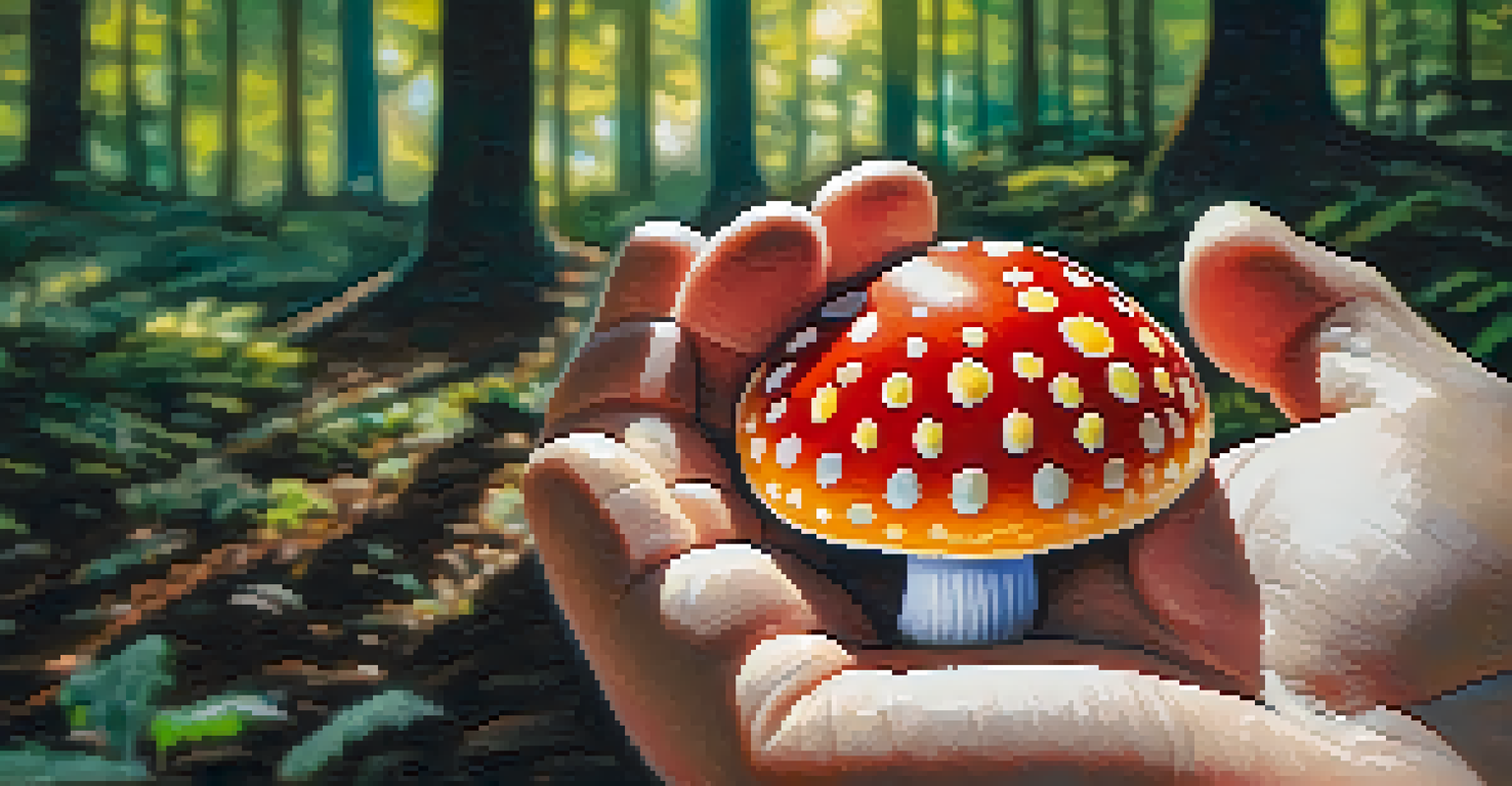Understanding Grief: Entheogens as a Coping Mechanism

What is Grief and Why It Matters in Our Lives?
Grief is a natural response to loss, encompassing a range of emotions from sadness to anger. It can occur after the death of a loved one, the end of a relationship, or any significant change. Understanding grief is essential because it affects our mental and physical health, influencing how we cope with life's challenges.
Grief can be a burden, but also an anchor. You get to choose how you carry it.
The grieving process varies for everyone, often described in stages such as denial, anger, bargaining, depression, and acceptance. These stages are not linear; people can move back and forth between them. Acknowledging this complexity allows us to be more compassionate towards ourselves and others who are grieving.
Grief can feel isolating, but it's a universal experience that connects us all. Sharing stories, seeking support, or expressing emotions can be powerful steps in navigating this difficult journey. Recognizing the significance of grief is the first step towards healing.
What Are Entheogens and Their Historical Context?
Entheogens are substances that induce altered states of consciousness, often used in spiritual or religious contexts. Many cultures have utilized these substances, such as psilocybin mushrooms or ayahuasca, for centuries in rituals aimed at understanding life's mysteries and achieving profound insights. This rich history offers a backdrop for understanding their potential modern applications.

The term 'entheogen' itself is derived from Greek, meaning 'generating the divine within.' These substances can facilitate deep emotional experiences and may aid individuals in confronting their grief. By altering perception, entheogens can create a sense of connection to something greater, helping people process their losses.
Grief is a Complex, Universal Journey
Grief encompasses a range of emotions and is a natural response to loss that affects our mental and physical health.
In recent years, there has been a resurgence of interest in entheogens, particularly in therapeutic settings. Researchers are exploring their potential benefits for mental health disorders, including PTSD and anxiety, which can often accompany grief. This renewed focus reflects a broader acceptance of alternative healing methods.
The Science Behind Entheogens and Grief Processing
Recent studies suggest that entheogens may help people rewire their brains, fostering new neural connections that aid in emotional processing. This neuroplasticity can be particularly beneficial for those dealing with grief, as it allows for new perspectives and coping mechanisms to emerge. By altering brain chemistry, these substances can encourage feelings of openness and acceptance.
The wound is the place where the Light enters you.
Moreover, entheogens have been shown to promote introspection and self-reflection, enabling individuals to confront their grief more directly. They can provide a safe space for exploring painful memories and emotions, which might otherwise be too daunting to confront. This process can lead to catharsis and a deeper understanding of one's grief journey.
Importantly, the therapeutic use of entheogens should be approached with caution and ideally under professional guidance. The power of these substances can evoke intense emotions, and having a supportive environment is crucial for safe exploration. This controlled setting can help individuals make sense of their experiences and integrate their insights into everyday life.
Personal Experiences: Anecdotes of Grief and Healing
Many individuals who have turned to entheogens in their grieving process report transformative experiences. For example, a person mourning a parent might find solace in a guided psilocybin session, where they feel a profound connection to their lost loved one. These experiences can provide clarity and a sense of peace that may have felt elusive in everyday life.
Anecdotes abound of people experiencing a shift in their relationship with grief, moving from pain to acceptance. One woman, who lost her partner, described a journey with ayahuasca that allowed her to relive their happiest moments together, providing comfort in her sorrow. Such stories highlight the potential for entheogens to foster healing in ways traditional methods sometimes cannot.
Entheogens May Aid Grief Processing
Entheogens can facilitate emotional exploration and introspection, helping individuals confront and process their grief.
However, it's essential to recognize that these experiences are deeply personal and not universally applicable. While some may find healing through entheogens, others might not resonate with such methods. Understanding and respecting individual paths through grief is paramount.
Cautions and Considerations When Using Entheogens
Engaging with entheogens can be a powerful experience, but it's not without risks. Individuals with a history of mental health issues or those currently experiencing severe emotional distress should approach these substances with caution. It's crucial to consult with a healthcare professional before embarking on this journey to ensure safety.
Setting plays a vital role in the effectiveness of entheogen experiences. A supportive, comfortable environment can significantly influence the outcome, while a chaotic or unsafe setting can lead to negative experiences. This highlights the importance of preparation and understanding one's intentions before using these substances.
Finally, integrating the insights gained from entheogen experiences into daily life is essential for long-term healing. This might involve journaling, therapy, or simply sharing one's experience with trusted friends. By making sense of these profound moments, individuals can weave newfound understanding into their ongoing journey with grief.
Finding Support: Therapy and Community Resources
Support systems are vital for anyone navigating grief, and they can be particularly important for those exploring entheogens. Therapy can provide a safe space to discuss feelings, process experiences, and gain tools for coping with loss. A skilled therapist familiar with entheogen integration can enhance the healing process significantly.
Community resources, such as support groups or workshops focused on grief and healing, can also be beneficial. Sharing experiences with others who understand can foster feelings of connection and belonging. These groups can also provide valuable insights and recommendations for safely exploring entheogens as a coping mechanism.
Support Systems Enhance Healing
Therapy and community resources are vital for navigating grief, especially for those considering alternative methods like entheogens.
Additionally, online communities have emerged, offering platforms for individuals to share their stories and seek advice. These forums can provide support and information on navigating the complexities of grief, whether through traditional methods or alternative approaches like entheogens. Building a supportive network can make a significant difference in the grieving process.
Conclusion: The Path to Healing Through Grief and Entheogens
Navigating grief is a deeply personal journey, and for some, entheogens may offer a unique avenue for healing. While they can provide profound insights and emotional breakthroughs, it's essential to approach them with care and respect. Understanding the risks and benefits can empower individuals to make informed choices about their healing process.
Ultimately, grief is not something to be 'fixed'—it's a natural part of life that requires time and space. Entheogens can serve as a tool, but they are not a replacement for the emotional work that comes with grieving. The combination of personal introspection, community support, and professional guidance can create a holistic approach to healing.

As we continue to explore the intersection of grief and entheogens, it's crucial to honor each person's path. By fostering open conversations and sharing experiences, we can create a compassionate environment where healing is possible, no matter how we choose to navigate our grief.